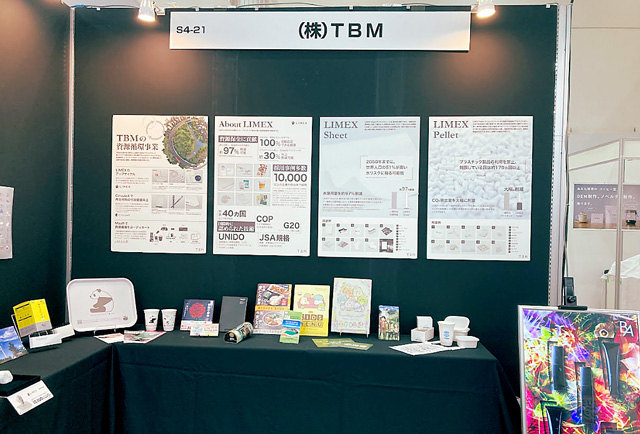JETRO Global Connection -Accelerate Innovation with Japan-
Interview
TBM, a Japanese Unicorn, is taking its environmentally conscious materials and solutions global
(Japan)
Apr 18, 2025

Today, the world is awash with waste. Plastic is clogging landfills and the oceans, while trees continue to be cut down for paper and cardboard production. Both paper and plastic production have large climate impacts, and with the past year seeing record fires, floods, and typhoons, there are growing concerns that climate change is here, and the world needs to shift to sustainability fast.
TBM![]() has a solution. The Japanese startup, founded by Nobuyoshi Yamasaki in August 2011, specializes in developing, manufacturing, and selling plastic and paper alternative made from limestone, a material known as LIMEX
has a solution. The Japanese startup, founded by Nobuyoshi Yamasaki in August 2011, specializes in developing, manufacturing, and selling plastic and paper alternative made from limestone, a material known as LIMEX![]() .
.
“We are developing ecological materials and also promoting material circulation,” said Toshihiko Ito, Global Market Development Manager at TBM.

TBM’s LIMEX factory in Miyagi, Japan. (Photo provided by TBM)
LIMEX is crafted by combining limestone with general-purpose and plant-derived resins, along with various additives. This unique blend is uniformly kneaded to create a versatile material that can replace traditional plastics and paper, suitable for both indoor and outdoor use.
“LIMEX is very affordable, with low price volatility compared to petroleum-based conventional plastics, and has been adopted by more than 10,000 companies and municipalities around the world,” said Yukari Kikuchi, Section Head for Global Business at TBM.
The best thing is that LIMEX production requires significantly less water and is less energy-intensive than paper or plastic, minimizing greenhouse gas emissions. In fact, their Japan factories utilize nearly 100% renewable energy in their production.

LIMEX being demonstrated at an event (Photo provided by TBM)
So far, LIMEX has proven quite lucrative for TBM. They’ve grown steadily, with over 300 employees and a valuation of more than 130 billion Japanese Yen, and offices in Vietnam, and the United States. TBM also has two factories in Japan, one in Vietnam, and is providing LIMEX to customers across Asia, Europe, and North America. In fact, they’re a unicorn, considered one of Japan’s most successful startups.
“Thanks to our investors, subsidies and grants we have been expanding step by step,” said Kikuchi. “Because we need actual production sites for LIMEX, we need a lot of capital.”
TBM’s success and growth can be tied to its innovative, and a strategy to grow production while expanding to new markets. What makes LIMEX such an attractive solution for customers?
One is TBM’s sustainable sourcing and production approach. TBM procures calcium carbonate powder from trusted suppliers, ensuring a stable supply. Because limestone is an abundant resource, the environmental impact is limited.
For customers, using LIMEX reduces dependence on oil, wood, and water, inputs typically required for plastics and paper. That makes it a more sustainable option, something increasingly a key concern in markets like Japan and Europe.
Also notable – LIMEX can be more affordable compared to conventional plastics and cost savings are a key driver, especially in regions like Southeast Asia.
“Some customers are more interested in cost reduction,” said Ito. “But I have the impression that the awareness of our customers is gradually changing and that the number of global companies that care about the environment is gradually increasing.”

TBM is one of Japan’s most successful startups and has been showcased at conferences around the world (Photo provided by TBM).
That means LIMEX can provide both an affordable and sustainable product – making it appeal to customers across the spectrum.
“TBM considers it important to strike a balance between environmental benefits, cost, and quality,” said Kikuchi. “Because products that are good for the environment, but expensive or poor in terms of quality will not be desired, but products that are bad for the environment won’t last as a business.”
While LIMEX has customers around the world, they see opportunities to expand penetration in particular regions, with one area of focus being the Middle East.
“We’re keen to expand to the Middle East, because we believe there are significant investments in sustainable infrastructure and green technologies, and growing interest in alternative materials,” said Ito.
JETRO has played a role in TBM’s international expansion, connecting them with partners in regions like Southeast Asia, and helping them overcome barriers and challenges.
“We received advice on how to develop strategies, how to showcase ourselves, and how to present our company,” said Kikuchi. “In the future, we also intend to actively participate in various JETRO consultations and online and offline events to gather information about regions where we’ve not yet actively entered.”
Beyond expanding to new markets and customers, TBM has a commitment to become even more sustainable through constant innovation.
“We believe that only producing an eco-conscious material like LIMEX is still not good or sustainable enough,” said Ito.
To improve their sustainability, TBM is, firstly, focusing on circularity by promoting recycling and reuse of LIMEX in Japan, and, in the future, around the world too. Eventually, they hope all LIMEX is part of a closed loop system.
Secondly, by 2030, the company is aiming to be carbon negative – emitting less CO2 and greenhouse gases into the atmosphere than it produces. One way to do that is through carbon capture, replacing natural limestone with Carbon Dioxide (CO2) emitted from facilities, which would further reduce LIMEX's carbon footprint and reinforce its commitment to sustainability and resource conservation.
“So under this concept, we don't have to no longer use the limestone from mountains, instead, we can recycle the CO2 and make a much more eco-conscious material,” said Ito.
Right now, Carbon Recycled (CR) LIMEX is being produced in Japan, and a lot of work will have to be done to reduce its cost, expand the number of CR LIMEX grades, and scale production globally. But for TBM, this is essential to the future of the company.
“This is actually currently our biggest focus in the next phase of LIMEX,” said Ito.
It makes sense. As more customers express concerns about the environment and sustainability, TBM must ensure it’s producing even-more environmentally friendly beneficial solutions. That was how they achieved so much success, and how they plan to continue to meet the needs of a growing number of customers well into the future.
Toshihiko Ito, Global Market Development Manager
Ito joined TBM Co., Ltd. in 2021 and he had led the global business development for 4 years. Ito has worked since January 1 as General Director of TBM VN Co., Ltd. in Hanoi, Vietnam. TBM VN is managing the local production of LIMEX and dedicating also the sales activity of LIMEX and Recycled Plastic. He is leading the overall corporate activity. Before joining TBM, Ito had worked for a large Japanese trading company and manufacturer, and experienced Business Development in various countries and regions such as MENA and APAC for 18 years.

Yukari Kikuchi, Section Head for Global Business
Kikuchi is currently responsible for the global expansion of LIMEX products manufactured in Japan and Vietnam.
For 12 years, she worked for a Japanese steel trading company, trading raw materials of steel for major steel manufacturers, developing market and operation of overseas plants.
After a year and a half of maternity leave, she joined TBM, a leading sustainability company in Japan.
While balancing work and childcare, she shows her dedication to expand LIMEX overseas.

- Report by:
- KANIE Ryoma, Startup Support Division, JETRO

-
Overview of Japanese Startup Investment for US Venture Capitalists

May 2025
-
TBM, a Japanese Unicorn, is taking its environmentally conscious materials and solutions global

April 2025
-
Algal Bio’s Plan to Scale-up Microalgae Solutions for Food, Health, Climate, and more

March 2025
-
From Complexity to Clarity: How Veritus Helps Professors and Research Labs Innovate 5X Faster

February 2025
-
Biodata bank: Innovating Heat Risk Solutions for a Warming World

February 2025
-
Thermalytica’s Improved, Nano-scale Insulation Technology Could Change the World

January 2025
-
Techstars Tokyo Demo Day shows how Japan is Making Strides Towards Becoming a Global Startup Hub

December 2024
-
Redefining Health Through Better Movement with Shosabi

December 2024



